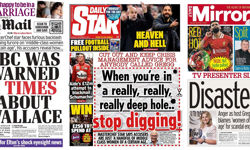When Rebekah Brooks was made chief executive of News International in 2009, I was one of the women called to her office from around the company to discuss ideas and new ways forward. No, I didn’t suggest phone-hacking as a strategy and yes, at the time, it felt oddly flattering and complicit to have one-on-one time with the boss. Forgive me: I was mesmerised by how she managed to stay upright on impossibly high heels and the emptiness of her desk, not on the fine details of the future of the company. The things I could have asked in retrospect…
It was refreshing nonetheless. Brooks was one of us. As a young features editor at the News of the World, Brooks (then Wade) had claimed she was banished from editorial conference by her male colleagues. That all changed with her spectacular rise to the top. She’d even introduced a hairdressing salon to Wapping: anyone, hack or hackette, executive or cleaner, could sit next to her while she was having her exotic tresses done. We are all multi-dimensional and one of her stronger dimensions was playfulness. Just ask David Cameron.
Four years on and with the prospect of Brooks’ trial later in the year, I often find myself reflecting on the flame-haired one, her life in journalism and her legacy.
Will the hairdressing initiative prove to be her finest hour?
If I sound sceptical, I am. I’ve applauded women achieving senior editorial and managerial positions often enough and then found myself pondering, when things began to go wrong, whether they had only been offered those positions when it was clear to various boards that those particular jobs were going down the pan.
On International Women’s Day this year, I was invited by former colleague Neil Fowler to give a talk at Nuffield College, Oxford on women and the media. A little darkness descended on my soul: had journalism failed female journalists, I wondered, or had we female journalists failed journalism and our readers? We have the vote, a voice and a smattering of power here and there. What have we done with it?
Brooks was on my mind, as were the expectations of my generation of journalists and a generation to come. Most postgraduate journalist trainees are now female. The future, it would appear, is in their hands.
While I was a student, Margaret Thatcher became Prime Minister. Shoulder pads and big hair were all the rage – Brooks, as we know, favoured the look – and women were asserting their place and space in the world.
Under-represented at the top
Though sexism in the workplace was rampant, my generation of young female newspaper journalists thought we would be running newspapers ourselves one day. Some of us have, though strikingly not as often as the men or with such prize specimens to nurture. Just think of the serious broadsheets. Today there are no female editors of any national newspaper, other than the Daily Star. There are fewer women visible at the highest level of the industry than a decade ago.
This state of affairs is not exclusive to news organisations: as we all know, women are abysmally represented in government and on the boards of our leading companies and lose their jobs first in a recession. In addition, social mobility is slipping backwards and people, most often women with families or the fantasy of such an idyll, are often in fear in their workplace.
Should we really care that the spoiled divas of the media are suffering some of the same problems as women everywhere? I happen to think we should. Journalism exists to challenge the status quo, not to replicate it. If female journalists can’t begin to examine themselves, what serious impact are they going to make on their readers, audience and on commercial survival?
When you are part of a culture, you stop seeing its weaknesses because you are too busy getting on with the job. But you would have to be extraordinarily dense not to have noticed how ageism, for example, has been cutting short the careers of senior female broadcasters or the vociferous complaints made on their behalf to the BBC. When I left the Sunday Times a year ago, it did seem to me that women were being pushed out or down at a quicker rate than men but I have no solid evidence. A study of the impact of recent redundancies and of the impact of part-time working on women would be timely. News International for the most part had been a good employer. Colleagues at the Mail, Guardian and Independent – speaking to me in confidence – were not so sanguine. They had witnessed many women demoted after returning from maternity leave or simply shoved aside so that the men could get on with the serious jobs, particularly in news, politics and business. They reported a greater amount of distress about unfair treatment over the years than the women at News International.
Endemic sexism
I have come to question what I have accepted as normal in my working life and frankly, it’s taken long enough. In my twenties, I was pulled aside by a news editor at the Sunday Mirror who said he would make me rich and famous if I slept with celebrities. At the time, it was the norm to talk like this and there was a culture of drink and sex you couldn’t imagine today. Well, almost. There are still young women who find favour with male editors in a very particular way.
In my thirties, a senior Guardian grandee, interviewing me for a job at the Observer, was appalled when he learned how many children I had and asked how I managed and what childcare I had in place. I was shocked. No tabloid editor had ever suggested – which he was – that being a mother meant I might not be able to do my job. At the Sunday Times, I’ve had a cricket ball thrown at my head because the editor wanted to amuse himself and the norm, when presenting the magazine for his weekly inspection, was for him to insist I couldn’t speak. A sign of affection? Possibly given I was there for seventeen years. Last year, I tried a week on the features desk of a national tabloid – I’m not naming it but it’s fond of moral outrage on the front page while exposing acres of young flesh on its successful website - where there were three middle-aged men on the desk, all of them with families. And two young women conspicuously without. When I asked whether a woman with children had ever worked on the desk before, they whispered no… and they thought this was a problem. I didn’t stay.
Climate of fear
I’ve tended to find this kind of stuff amusing because, for thirty years, I survived it all and love my job. It’s hardly a catalogue of personal woe and I’m proud of the important stories I’ve played a part in breaking but then I’m also holding back on some of the extreme day-to-day treatment I have seen others suffer. I’m far less amused by what I perceive to be a creeping bullying and climate of fear in the workplace that appears to hit women particularly hard. No-one seems to believe they have rights. I know of young men and women who have worked full-time for years without any contract in place. Assessments and reviews are often an unaccountable farce. Who you know not what you know has never been more apparent.
Within newspapers and publishing, a layer of editors has simply been stripped away and with it the dynamic, mentoring, relationship-building between editor and writer that produces the best work. Despite the sexism, my generation had that level of camaraderie and mentoring from women and men.
Which touches on another concern. Suzanne Moore, who recently lost her column on the Mail on Sunday, told me she wasn’t worried about women losing their voices as columnists but she was concerned about women losing their voices as reporters. About the fact that women still get shoved in to the softer end of newspapers. The former investigative reporter Jean Rafferty – another woman to have left journalism, expressed it this way when talking about her time at the MoS:
I struggled for years to get things out on Satanic ritual abuse (I know, but it got to me!) but because the media works in stereotypes, I'd get paid but the pieces would never appear. They prefer easily understood narratives, like wicked social workers and victimised families, rather than the more complex and possibly actionable business of supposedly respectable people getting involved in abuse networks.
The maleness of the agenda also means that party politics are considered the most important thing in newspapers. For me, politicians are mostly tossers and poseurs. The real interest in politics is in its social effects. But the political correspondents are the ones with the kudos and the big salaries, whereas the feature writers, who're mostly women and who tell you how policies affect people on the ground, are regarded as 'soft'.
Newspapers are in decline and the new models for generating quality news and a profit aren’t yet in place. Aside from all the serious technological and economic difficulties facing news providers, they are also struggling to speak effectively to their readers, just as politicians are struggling to reach the electorate. It’s not surprising that David Cameron’s popularity amongst women has plummeted: they are being hardest hit by current policy.
Controversialist Julie Burchill has warned me to get a grip: female journalists are all self-adoring and ambitious, she argues, and if we cared, we’d be teachers or nurses. Her greatest concern is that a working class girl like her or me wouldn’t find a place in print today.
She has a point. Burchill never tried to fit in but most female journalists, most women, do. Because we can’t know what others around us earn, we don’t negotiate well for our own pay and we don’t challenge. We want to be liked in a way men rarely do and that presents its own dangers. When something is rotten and we accept it, we are in danger of not being just victims but colluders. Perhaps we work too hard to fit in, to imbibe a culture and then something vital gets lost along the way.
This focus on the deadline and not on the bigger picture has helped newspapers on the path to rapid decline. The waste of female talent and with it, the ability to connect with at least half of the British population, the imposition of corporate and not journalistic values appears to me to be commercial suicide.
If you need to be convinced - just look at Rebekah.












